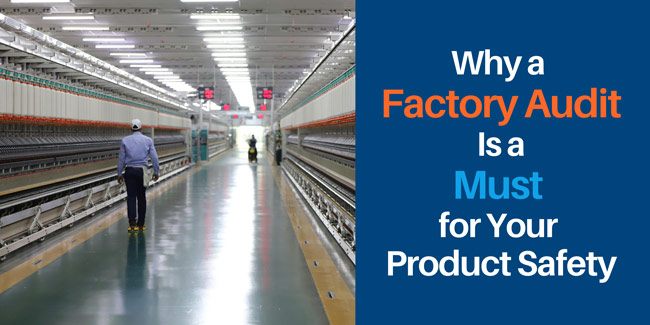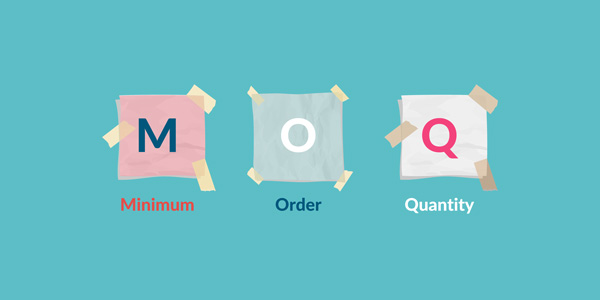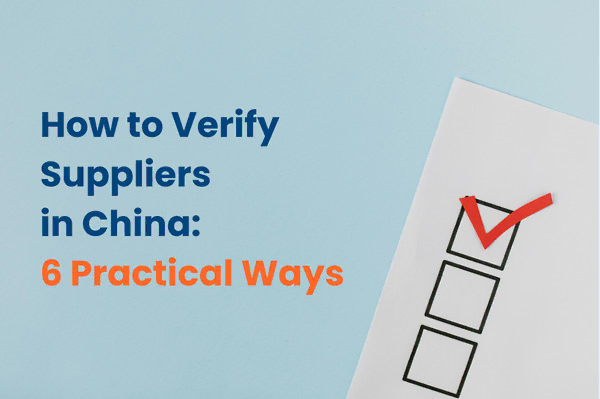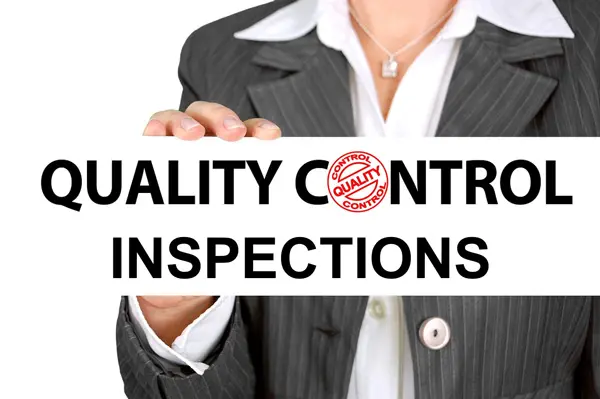Why a Factory Audit Is a Must for Your Product Safety
- Date:
- Author: SVI Content Team
- Share:

When adding a new supplier to your supply chain, it is essential to run a factory audit to see if it meets your expectations. Many companies (like Target, Walmart, UNIQLO) have strict audits of their suppliers, so you can know how important it is to verify production standards. It is a best practice worth following for businesses that value long-term quality and trust.
An audit report tells you the working conditions and production capabilities of a manufacturer. It helps you reduce risks and confidently partner with a responsible supplier.
In this blog, you will learn what a factory audit covers, how the process works, and how it benefits your brand, and more. Let’s get started!
Part 1. What Is a Factory Audit
A factory audit is a systematic evaluation of a manufacturing facility to assess its compliance with labor, safety, environmental, and quality standards based on your requirements. It acts as a critical checkpoint to ensure that suppliers operate ethically and legally and meet your needs before placing orders.
The factory audit standard can vary as companies could require a focus on certain points and have their own audit standards, or if you use third-party services such as SGS, BV, they have their own standards as well.
Main Types of Factory Audits
The audits can be categorized into different types that focus on specific aspects.
| Types | Focus Area |
|---|---|
| Social Compliance Audit | Focus on labor conditions, worker rights, and safety. |
| Quality Audit | Evaluate the factory's quality management systems and ability to meet product specs and volumes. |
| Environmental Audit | Check compliance with environmental laws and sustainability standards. |
| Security Audit | Assess supply chain security (e.g., C-TPAT), especially for U.S. imports. |
What Should Be Inspected in Factory Audits
Usually, audits review factory records, working conditions, and physical premises to identify issues and verify adherence to contractual and regulatory standards. The details involve:
| Category | Key Inspection Points |
|---|---|
| Workers | ✅ Labor contracts and employment records ✅ Worker age verification (avoid child labor) ✅ Worker training programs ✅ Health and safety training records ✅ Attendance and working hours records |
| Production Capacity | ✅ Type and condition of machines (manual, semi-auto, fully automated) ✅ Machine maintenance logs and repair records ✅ Machine capacity (how much they can produce per day/week) ✅ Production workflow (raw material to finished product) ✅ Inventory handling and warehouse organization |
| Quality Control Process | ✅ Material traceability ✅ Pre-production inspection/testing ✅ In-line product inspection/testing ✅ Final inspection/testing ✅ Packaging and labeling processes |
| Environmental Controls | ✅ Waste management procedures ✅ Emission control measures ✅ Chemical handling and storage |
| Factory Security and Safety | ✅ Cleanliness and organization ✅ Security & safety systems (exits, alarms, drills, extinguishers, CCTV) ✅ Ventilation and lighting ✅ Availability of backup power systems |
| Company Verification and Certification | ✅ Business license and registration ✅ Years in operation ✅ Export/import licenses (if needed) ✅ Valid Certifications (ISO 9001, BSCI, Sedex, WRAP, etc.) |
Part 2. Why Factory Audits Are Necessary
The main reason why supply chain factory audits matter is that they are the records you rely on to choose a suitable factory for your production. The process of different types of audits helps you check whether the factory:
- Adhere to ethical and sustainable practices
- Meet the product quality standards
- Fulfil your order requirements with their capacity
- If it is reliable for a long-term partnership
Through these, you will have an overview of suppliers’ working environment, labor and safety system. You can partner with the right one, which can ensure you:
1) Source Ethically and Sustainably
When you are committed to social and environmental responsibility, compliant suppliers should be your top consideration in ethical and sustainable sourcing.
And audits verify that suppliers operate without child or forced labor, provide safe working conditions, and have proper environmental controls for waste and resource use.
2) Detect and Address Potential Violations Early
Regular supply chain factory audits can spot any issues or violations before working with the factory. By identifying problems early, you can solve them to reduce potential risk and safeguard your brand.
3) Enhance Product Quality
Manufacturers with appropriate quality control systems throughout the production process ensure products are made according to your specifications, which leads to better quality.
4) Lower Supply Chain Risk
By catching the potential issues early, you can reduce risks (quality issues, delayed production, etc.) that could cause disruption and have a more stable and compliant supply chain related to the manufacturing stage.
5) Facilitate Ongoing Business Relationships
A report provided by suppliers can promote transparency between buyers and factories. It facilitates trust and strengthens the relationship between both sides.
6) Improve Supplier Performance
Audits often come with corrective action plans. Factories can use audit feedback to guide them in improving their operations, efficiency and workforce management.
Need Help for Your Sourcing Project?
Let SVI Global find the right suppliers and manage your project.
We guarantee quality and on-time delivery!
Part 3. How a Manufacturing Audit Is Actually Done
The factory audit process typically involves several stages:
Step 1. Preparation
Auditors will review factory records and gather background information at the beginning.
Next, they prepare for the inspection and customize an audit checklist based on the industry standards and the company’s requirements.
Step 2. On-Site Inspection
Auditors visit the factory to observe physical working conditions, examine records, assess production processes, and inspect security systems. Factory management and workers may be interviewed during this stage.
This lets them have a holistic understanding of the factory, evaluate compliance with established standards, and look for inconsistencies or signs of falsification.
Step 3. Identifying Violations
Drawing from both visual observation and review of records, any violations related to labor rights, safety protocols, or record falsification are documented.
Auditors may triangulate data from multiple sources to confirm compliance or uncover falsification.
Step 4. Audit Reporting
After the visit, auditors compile detailed reports, including photo evidence, violations, and expert insights.
These reports go through an internal review process to ensure accuracy and may require the auditors to revisit the site for clarification or additional data.
Step 5. Final Assessment
Companies receive the full report. Based on the findings, the factory will get a rating from buyers who use this information to score.
Rating systems can be simple (pass/fail) or more detailed with numerical scores or risk levels that show whether you meet the threshold. It will directly affect your decision to approve, monitor, or discontinue the partnership.
Step 6. Corrective Action Plan (CAP)
If issues are exposed in the audit, manufacturers have the opportunity to tackle and stay compliant. A corrective action plan should be submitted, outlining how and when they will fix the issues.
After getting the updates that show the latest status, related workers will verify the improvements to secure adherence to standards.
FAQ about Factory Audits
Q1. How often should you audit a factory you worked with?
Generally, factory compliance audits are conducted annually or biannually for suppliers.
For manufacturers with more issues, more frequent audits may be necessary.
Q2. Can you skip the audit if the factory has good reviews?
No, good reviews don’t guarantee ongoing compliance or quality.
Manufacturing Audits provide firsthand, up-to-date verification of factory conditions. Even if the results won’t completely prevent scams, skipping audits increases the risk of unnoticed issues that could harm your supply chain.
Q3. How long does a factory audit take?
The duration of an audit varies depending on the factory’s size.
Normally, on-site audits of small factories with fewer workers are completed in 1 day, while larger factories take 2 days or much longer.
A large amount of audit time is spent on data analysis. Auditors will find whether the data is consistent, and additional time may be needed to conduct interviews with factory management.
Q4. Is the factory audit announced or unannounced?
Most factories are notified in advance. Announced audits often show higher compliance because factories can prepare to present their best.
However, many audits are also conducted without prior notice. Unannounced audits reveal a more accurate picture of daily conditions and less manipulation.
Q5. Is a factory audit conducted internally by the factory or a third party?
Proper factory audits are usually outsourced to third-party auditors or conducted by the brand’s audit team to ensure impartiality and credibility.
Internal audits by the factory can be done regularly, but are less objective for buyers.
Q6. Can a failed audit be corrected?
Yes, factories that fail audits can improve their compliance through corrective actions. The system is designed to allow continuous corrections before potentially facing the loss of their supplier status.
Many brands allow a second chance. They introduce a stringent compliance threshold, requiring suppliers to reach a minimum score within a given several years.
As long as suppliers show progress, they can expect continued inclusion in the supply chain.
Q7. Difference between factory audits and product inspections
Factory Audits: checks the factory itself before production — its working conditions, records, safety, processes, and other compliance issues.
Product Inspections: checks the finished goods before shipment—quality, specifications, packaging, labeling, etc.
All in all, product inspections assess the conformity of the end product, rather than the working conditions or compliance practices within the factory production process.
How Can SVI Global Factory Audit Services Help You
Factory audits are useful to make sure your suppliers meet international standards and operate responsibly. If you’re sourcing a factory for your products with SVI Global and want to confirm they are qualified, you are well taken care of. We offer factory audit services based on your specific needs.
In 2024 alone, we have conducted 500 factory audits to help companies evaluate supplier facilities, processes, and compliance practices. But we don’t stop at audits. Our experts are able to analyze Production Management Control (PMC) and Supplier Quality Engineering (SQE) to give you a deeper understanding of supplier performance.
What We Do for Factory Assessment
- Production Capacity Evaluation
- Quality System Audit
- Social Compliance Audit
- C-TPAT Security Audit
- Retailer Specific Audit
- Licensor Specific Audit
At SVI Global, we do our utmost to locate the right factories and deliver exceptional quality. Our audits are independent, transparent, and built to ensure you receive high-quality services. We’re here for you. REACH OUT and let us take the stress out of sourcing!






